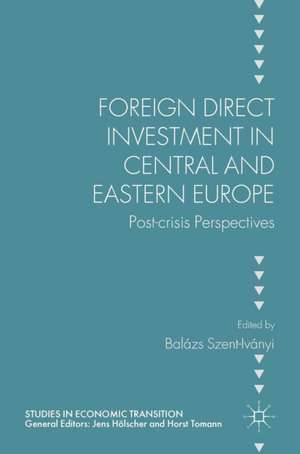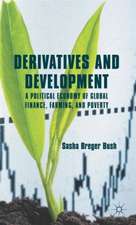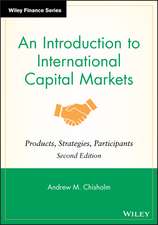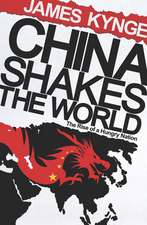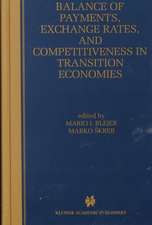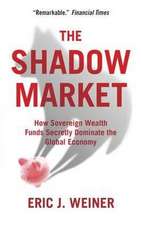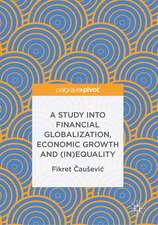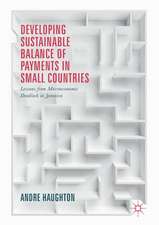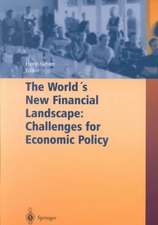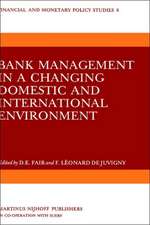Foreign Direct Investment in Central and Eastern Europe: Post-crisis Perspectives: Studies in Economic Transition
Editat de Balázs Szent-Iványien Limba Engleză Hardback – 4 ian 2017
| Toate formatele și edițiile | Preț | Express |
|---|---|---|
| Paperback (1) | 778.63 lei 6-8 săpt. | |
| Springer International Publishing – 7 iul 2018 | 778.63 lei 6-8 săpt. | |
| Hardback (1) | 782.42 lei 6-8 săpt. | |
| Springer International Publishing – 4 ian 2017 | 782.42 lei 6-8 săpt. |
Din seria Studies in Economic Transition
- 20%
 Preț: 695.03 lei
Preț: 695.03 lei - 15%
 Preț: 643.34 lei
Preț: 643.34 lei - 15%
 Preț: 649.54 lei
Preț: 649.54 lei - 15%
 Preț: 643.00 lei
Preț: 643.00 lei - 15%
 Preț: 643.48 lei
Preț: 643.48 lei -
 Preț: 390.63 lei
Preț: 390.63 lei - 15%
 Preț: 642.51 lei
Preț: 642.51 lei - 15%
 Preț: 643.65 lei
Preț: 643.65 lei -
 Preț: 386.39 lei
Preț: 386.39 lei - 15%
 Preț: 636.30 lei
Preț: 636.30 lei - 15%
 Preț: 639.08 lei
Preț: 639.08 lei - 15%
 Preț: 640.37 lei
Preț: 640.37 lei - 15%
 Preț: 644.95 lei
Preț: 644.95 lei - 15%
 Preț: 637.13 lei
Preț: 637.13 lei - 18%
 Preț: 944.99 lei
Preț: 944.99 lei - 15%
 Preț: 642.51 lei
Preț: 642.51 lei -
 Preț: 395.25 lei
Preț: 395.25 lei -
 Preț: 388.72 lei
Preț: 388.72 lei -
 Preț: 392.37 lei
Preț: 392.37 lei - 15%
 Preț: 640.71 lei
Preț: 640.71 lei -
 Preț: 394.51 lei
Preț: 394.51 lei - 15%
 Preț: 643.84 lei
Preț: 643.84 lei - 18%
 Preț: 731.59 lei
Preț: 731.59 lei - 15%
 Preț: 647.27 lei
Preț: 647.27 lei - 15%
 Preț: 642.18 lei
Preț: 642.18 lei - 15%
 Preț: 636.80 lei
Preț: 636.80 lei -
 Preț: 391.61 lei
Preț: 391.61 lei - 15%
 Preț: 638.43 lei
Preț: 638.43 lei - 15%
 Preț: 640.24 lei
Preț: 640.24 lei - 15%
 Preț: 643.84 lei
Preț: 643.84 lei - 15%
 Preț: 645.96 lei
Preț: 645.96 lei - 15%
 Preț: 635.47 lei
Preț: 635.47 lei - 15%
 Preț: 644.95 lei
Preț: 644.95 lei - 15%
 Preț: 644.95 lei
Preț: 644.95 lei
Preț: 782.42 lei
Preț vechi: 954.17 lei
-18% Nou
Puncte Express: 1174
Preț estimativ în valută:
149.71€ • 156.73$ • 123.88£
149.71€ • 156.73$ • 123.88£
Carte tipărită la comandă
Livrare economică 05-19 aprilie
Preluare comenzi: 021 569.72.76
Specificații
ISBN-13: 9783319404950
ISBN-10: 3319404954
Pagini: 250
Ilustrații: XVIII, 266 p. 28 illus., 24 illus. in color.
Dimensiuni: 148 x 210 x 20 mm
Greutate: 0.45 kg
Ediția:1st ed. 2017
Editura: Springer International Publishing
Colecția Palgrave Macmillan
Seria Studies in Economic Transition
Locul publicării:Cham, Switzerland
ISBN-10: 3319404954
Pagini: 250
Ilustrații: XVIII, 266 p. 28 illus., 24 illus. in color.
Dimensiuni: 148 x 210 x 20 mm
Greutate: 0.45 kg
Ediția:1st ed. 2017
Editura: Springer International Publishing
Colecția Palgrave Macmillan
Seria Studies in Economic Transition
Locul publicării:Cham, Switzerland
Cuprins
Introduction: The Changing Patterns of FDI; Balázs Szent-Iványi.- 1. Post-crisis Crossroads for FDI in CEE; Kálmán Kalotay.- 2. Czech FDI Performance: Between Global Value Chains and Domestic Reforms; Tereza De Castro and Pavel Hnát.- 3. Foreign Direct Investment in Slovakia: The Tatra Tiger Gone Tame?; Martin Grančay and Nóra Grančay.- 4. Latecomers may be Admitted: Foreign Direct Investment between the CEE Countries; Magdolna Sass.- 5. Upgrading and Value Capture in Global Value Chains in Hungary: More Complex than what the Smile-curve Suggests; Andrea Szalavetz.- 6. Inequalities of Accumulation – The Case of Central and Eastern Europe; Annamaria Artner.- 7. Multinational Banks: Protective Factors of Financial Stability in Central and Eastern Europe?; Gábor Kutasi.- 8. Investment Promotion in the Visegrad Countries: A Comparative Analysis; Ágnes Tőrös, Ádám Mészáros and Ákos Dani.- 9. Competitiveness and Investment Promotion in Bulgaria and Romania; Sorin Gabriel Anton.- Conclusions: Prospects for FDI-led Development in a Post-crisis world; Balázs Szent-Iványi.
Recenzii
“This book sets out to describe and analyse the main developments in foreign direct investment (FDI), in terms of volume and structure … . For readers interested in CEE and the EU, this book can also provide valuable insights. The new trends it documents and analyses have not been reflected so far in appropriate policy responses. In this respect the volume provides policymakers with practical evidence and policy suggestions they would do well to consider and act upon.” (Liliana Pop, Europe-Asia Studies, Vol. 70 (7), 2018)
Notă biografică
Balázs Szent-Iványi is a lecturer in Politics and International Relations at Aston University, Birmingham, UK. He also holds an associate professor position at Corvinus University, Budapest, Hungary.
Textul de pe ultima copertă
This book examines how foreign direct investment (FDI) inflows to Central and Eastern Europe have changed after the Great Recession. It argues that beyond their cyclical effects, the economic crisis and the changing competitiveness of Central and Eastern European countries have had structural impacts on FDI in the region. FDI has traditionally been viewed as the key driver of national development, but the apparent structural shift means that focusing on cheap labour as a competitive advantage is no longer a viable strategy for the countries in the region. The authors argue that these countries need to move beyond the narrative of upgrading (attracting FDI inflows with increasingly higher value added), and focus on ensuring greater value capture instead. A potential way for doing this is by developing the conditions in which innovative national companies can emerge, thrive and eventually develop into lead firms of global value chains. The book provides readers with a highly informativeaccount of the reasons why this shift is necessary, as well as diverse perspectives and extensive discussions on the dynamics and structural impacts of FDI in post-crisis Central and Eastern Europe.
Caracteristici
Offers a rich glimpse into the changing dynamics of FDI inflows, intra-CEE FDI, government policies and investment promotion after the crisis Explores the structural impacts of FDI in post-crisis Central and Eastern Europe Relates findings to standard FDI theories such as Porter’s value chain based optimisation and Dunning’s investment development path model
